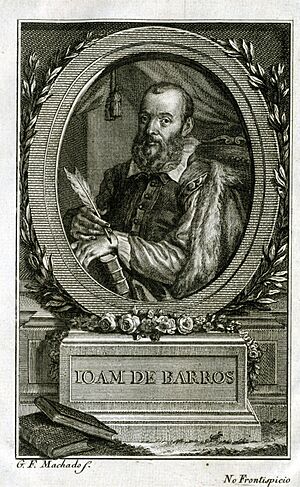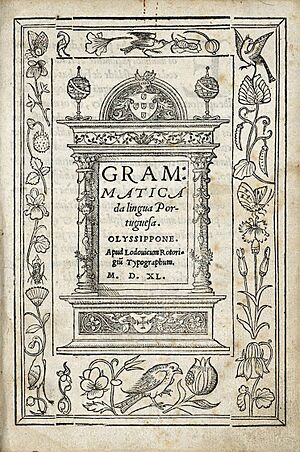João de Barros facts for kids
Quick facts for kids
João de Barros
|
|
|---|---|
 |
|
| Born | 1496 Viseu, Kingdom of Portugal |
| Died | 20 October 1570 (aged 73–74) Santiago de Litém, Pombal, Kingdom of Portugal |
| Occupation | Historian, factor at the Casa da Índia |
| Notable works | Decades of Asia, Chronicle of Emperor Clarimund |
| Signature | |
 |
|
João de Barros (Portuguese pronunciation: [ʒuˈɐ̃w dɨ ˈβaʁuʃ]; 1496 – 20 October 1570) was one of Portugal's first great historians. He is most famous for his book series, Décadas da Ásia (Decades of Asia). This important work tells the story of the Portuguese people in India, Asia, and parts of southeast Africa. People sometimes called him the "Portuguese Livy" because Livy was a famous Roman historian.
Contents
Early Life and Royal Service
João de Barros was born in Viseu, Portugal, around 1496. His father, Lopo de Barros, worked for the royal family of Manuel I of Portugal. João grew up in the royal household and became a page to Prince John, who later became King John III.
He received his education at the palace. When he was about twenty, he wrote a knightly adventure story called Chronicle of the Emperor Clarimund. Some say Prince John even helped him write it!
When King John III became king, he gave Barros an important job. In 1524, Barros became the captain of the fortress of St George of Elmina. The next year, he became the treasurer of the India House, a job he held until 1528.
In 1530, Barros moved from Lisbon to his country home near Pombal to escape a serious illness called bubonic plague. There, he finished writing a moral story called Rho pica Pneuma.
A Key Role in Trade
When he returned to Lisbon in 1532, the king gave Barros an even bigger job. He became the factor of the "Casa da Índia e da Mina" (House of India and Mina). This was a very important and responsible position. At that time, Lisbon was the main European city for trade with the East.
Barros was a good leader. He worked very hard and was honest, which was rare back then. Because of his honesty, he didn't get rich like some people in his position. He focused on doing his job well.
Adventure in Brazil and a Shipwreck
In 1534, King John III wanted to encourage people to move to Brazil. He created twelve special areas called captaincies along the coast. These areas were given to important people called donatários or lord-proprietors.
Barros was one of the first people to receive a captaincy in Maranhão. He teamed up with two merchants and sent a large group of ten ships and 900 men to Brazil.
Sadly, the ships' pilots made mistakes, and the entire fleet was shipwrecked. This caused Barros to lose a lot of money. Even so, Barros showed his good character by paying the debts of those who had died in the expedition.
Writing the Decades of Asia
After the disaster in Brazil, Barros continued his studies in his free time. He then offered to write a history of the Portuguese in India, which would become his famous Décadas da Ásia. The king agreed, and Barros started working right away.
Before publishing the first part of his history, he also published a Portuguese grammar book in 1539. He also wrote more moral stories. In 1543, he wrote Diálogo evangélico sobre os artigos da fé contra o Talmud dos Judeus, which included some strong opinions against Jewish people.
The first book of the Décadas da Ásia ("Decades of Asia") came out in 1552. It was very popular! The king then asked Barros to write a history of King Manuel. However, Barros was too busy with his other work, so another historian, Damião de Góis, wrote that book instead.
The second Decade was published in 1553, and the third in 1563. Barros passed away before he could publish the fourth Decade. This last book was finally published in 1615, after his death. It was put together by another writer, Joao Baptista Lavanha, who used Barros's notes.
His Decades tell the early history of the Portuguese in India and Asia. Barros studied the writings of historians and geographers from the East, as well as records from his own country. His books are known for being clear and well-organized. They are also exciting to read. For example, he describes how the king of Viantana killed Portuguese ambassadors by throwing them into boiling water and then feeding their bodies to dogs.
Later, another writer named Diogo de Couto continued the Décadas, adding nine more books to the series. A complete edition of all the Decades was published in Lisbon between 1778 and 1788.
Later Years and Legacy
In January 1568, João de Barros retired from his important job at the India House. King Sebastian gave him the special title of fidalgo and a pension (regular payments). Barros passed away on 20 October 1570.
Works
João de Barros wrote many books during his lifetime. Here are some of his most famous works:
- (1520) Chronica do Emperador Clarimundo: A story about a fictional emperor.
- (1532) Rhopica Pneuma, ou mercadoria espiritual: A book about spiritual matters.
- (1539) Grammatica da lingua portuguesa: A grammar book for the Portuguese language.
- (1540) Dialogo da viciosa vergonha: A dialogue about bad habits.
- (1552) Primeira Década da Ásia: The first part of his famous history of Portuguese actions in the East.
- (1553) Segunda Década da Ásia: The second part of his history.
- (1563) Terceira Década da Ásia: The third part of his history.
- (1613) Quarta Década da Ásia: The fourth part, published after his death.
See also
 In Spanish: João de Barros para niños
In Spanish: João de Barros para niños
 | Stephanie Wilson |
 | Charles Bolden |
 | Ronald McNair |
 | Frederick D. Gregory |


